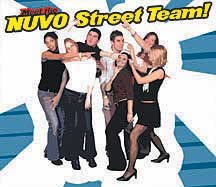Pittsburgh Catholic apparently believes that its hometown alt-weekly should be wrapped in a brown bag and handed out from behind the counter. "We need to ensure that our children are protected from unhealthy and exploitative images of sexuality," says a representative of the local diocese who thinks it's "unconscionable" that Pittsburgh City Paper is openly distributed in public. “I’m not running a day care center,” City Paper editor Andy Newman tells the paper. “I have a newspaper, and I feel like other people are responsible for supervising their own children.”
Citing economic reasons, the general manager of Indiana Printing and Publishing Co. Inc. told Pittsburgh Business Times that the last issue of the arts and entertainment paper is on the streets this week. The two-year-old Pulp was unable to compete successfully for advertising with the larger and more established Pittsburgh City Paper, an AAN member owned by Steel City Media.
Sometimes word of mouth is a more effective way of promoting a paper than a print ad. That's why some alternative newsweeklies send street teams out to bars, movie theaters and cultural events to hand out freebies and stir up interest in their papers. When they dispatch their street teams to public places, alt-weeklies like NUVO and Boston's Weekly Dig are relying on a centuries-old marketing technique the music industry revived.
Noticing that The Washington Times hadn't run a single correction in nine days, City Paper editor Erik Wemple decided to provide that service in his own pages. Wrong name, wrong block, wrong date of crime: Such errors will be duly noted and corrected in the alt-weekly. City Paper will "manage this critical function," Wemple writes, because the Times "lacks the resources to run its own corrections."
Alt-weeklies may have to stop branding themselves as the papers unafraid to print the word "fuck." Editor Ben Fulton says Salt Lake City Weekly was briefly kicked out of Wal-Mart "because we used the f-bomb in our paper," Glen Warchol reports in The Salt Lake Tribune. City Weekly lost a week's distribution at the chain after a self-identified Christian stumbled upon the word in its pages and complained to the store's regional managers. Wal-Mart let the paper return based on promises of increased vigilance about the use of profanity.
Rather than just deliver the same old reliable features and columns every week, editors of AAN papers look for ways to tweak their content, thus attracting new readers and re-engaging the faithful. But there's no sense rounding up a focus group to predict what new ingredients will work when freelancers, staff and the guy on the next barstool are all eager to give their advice. John Dicker interviews editors of four weeklies who messed with the mix to get happy results.
Insider, a youth weekly that promises to bring readers "Rochester Remixed," debuted Friday. Editorial content includes weird news, breezily written mainstream news, snapshots of young people having fun, and two articles identified as "big stories." The free tabloid targets ages 25 to 34, according to the Gannett daily paper that publishes it. That age group is "wildly underserved," says Democrat and Chronicle Editor Mike Johansson. AAN member City Newspaper is published in Rochester.
Chad Oliveiri, managing editor of the Rochester, N.Y., AAN member publication, talks to editors of other alternative newsweeklies to anticipate how a new Gannett weekly, tentatively named The InsideR, could affect his market. Free weeklies the media giant has already launched in Boise and Cincinnati compete with AAN papers for advertising and promotional opportunities. The silver lining is that Gannett is selling large mainstream advertisers on the concept of appearing in free weeklies, Cincinnati CityBeat Editor John Fox says.
- Go to the previous page
- 1
- …
- 34
- 35
- 36
- 37
- 38
- 39
- 40
- …
- 48
- Go to the next page



